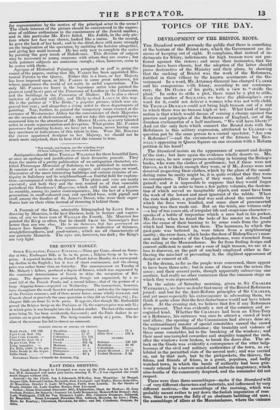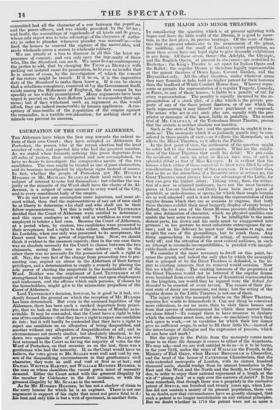TOPICS OF THE DAY.
DEVELOPMENT OF THE BRISTOL RIOTS..
Tilt Standard would persuade the public that there is something at the bottom of the Bristol riots, which the Government are de- sirous of keeping out of sight. It complains, that instead of in- dictments for felony, indictments for high treason were not pre- ferred against the rioters ; and more than insinuates, that the former have been chosen, lest the adoption of the latter should prove destructive of the Ministry and their plans, by showing that the sacking of Bristol was the work of the Reformers, fortified in their villany by the known sentiments of the Go- vernment In a word, Mr.Attorney-General has charged CLARKE and his companions with felony, according to our contempo- rary, the Dr. OATES of his party, with a view to " stoille the plant." In order to stifle a plot, there must be a plot to stifle. Even the mother of SOCRATES, we have the philosopher's own word for it, could not deliver a woman who was not with child. Sir THOMAS DENMAN could not bring high treason out of a riot in which there was no treason high or low. What kind of imagi- nation is that which would dream of coining a charge against the practice and principles of the Reformers of England, out of the drunken exclamation of a half madman, " We will have liberty?" And yet the only facts which connect the Bristol riots with the Reformers is this solitary expression, attributed to CLARKE—a question put by the same person to a casual spectator, "Are you. Reformer?"—and the circumstance of the fatuous boy BEN- DALL'S appearing in Queen Square on one occasion with a Reform petition in his hand!
The Standard insists on the appearance of concert and design in'the riots; but here again the evidence wholly deserts us. Mr. JONES says, he saw some persons assisting in burning the Bishop's books, who wore the clothes of gentlemen; but if these were not thieves, as it is likely enough they were, or if Mi. JONES were not deceived respecting their clothes, which by the glare of the smoul- dering ruins he easily might be, it is quite evident that they were no conspirators. Their object, if they were, had already been gained; and it is impossible to suppose that they would linger round the spot in order to burn a few paltry volumes, the destruc- tion of which served no imaginable object, and must have been the work of the lowest and most ignorant of the rabble. When the riots took place, a great deal was said about the materials by which the fires were kindled, and some show of preconcerted burning was then made out. But on the trials, one witness only —a boy of ten years old, of irregular life and suspicious character— speaks of a bottle of turpentine which a man had in his pocket. Mr. JONES, when he found the beds of his master on fire, found also the cause of their burning to be some coals from the grate which had been thrust into them. The hammers, by which the gaol-gate was battered in, were taken from a neighbouring smithy; the crow-bars, which broke the door of Bishop GRAY'S man- sion and the windows of the Chapterhouse, were wrenched from . the railing at the Mansionhouse. So far from finding design and concert sufficient to make out a case of high treason, we are at a loss to discover, on the part of anybody employed either in fur- thering the mischief or preventing it, the slightest appearance of design or concert at all.
In the drama, as far as the people were concerned, there appear to have been three acts ; but in none of these were the actors the same ; and their several parts, though apparently subserving one another, had really no other connexion than the common stage on which they were represented.
In the salute of Saturday morning, given to Sir CHARLES WETHERELL, we have no doubt that many of the Bristol Reformers joined ; and but for the Anti-Reform principles of Sir CHARLES, and yet more especially his extravagance in advocating them, we think it quite clear that the first disturbance would not have taken place. At the evening riot, we believe that few if any Reformers wcre present. That was evidently a riot of the common and re- cognized kind. Whether Sir CHARLES had been an Ultra-Tory or a Reformer, his entrance was sure to attract a crowd of boys and idlers; the opening of the Commission had always done so; the extraordinary muster of special constables caused the crowd to linger round the Mansionhouse ; the brutality and violence of these same constables led to the breaking of the windows; and their most unexampled cowardice and stupidity tempted the mob, after the windows were broken, to break the doors also. The at- tack on the Gaols was evidently a consequence of the utter help- lessness of the civil and military authorities of the town, as ex- hibited in the permitted riots of the second mob; and was carried on, not by that mob, but by the pickpockets, the thieves, the felons, and friends of felons, in a great, populous, and badly watched town, in which the bands of authority had been grie- vously relaxed by a narrow-minded and imbecile magistracy, which nine-tenths of the community despised, and the remainder did not respect.
There were thus three assemblages—mobs if the Standard will —of very different characters and materials, and influenced by very different motives,—the assemblage of the morning, which was probably meant rather to put down the foolish imputation of reae tion, than to repress the folly of an obstinate babbling old man; the assemblage of idlers at the Mansionhouse, where the violence committed had all the character of a row between the populc,,e0 and the peace officers, and was chiefly provoked by the latter ; and lastly, the assemblage of vagabonds of all kinds and de grees, whose only object was to take advantage of the abeyance of autho- rity in order to plunder wherever plunder was accessiyie—who fired the houses to conceal the capture of the anovee.bles, and made wholesale arson a screen to wholesale robbery. We are utterly at a loss to discover in all this *Ale least ap- pearance of concert; and can only envy the mgc.amity of those who, like the Standard, can see it. We must do oar contemporary the justice to add, that by charging Sir Thom DENMA.N with picking out isolated cases for prosecution, he ler.tves us to infer that he is aware of cases, by the investigation oal' which the concert of the rioters might be traced. If it be so,, it is the imperative duty of the Standard to make them known. If it can be shown that a rebellious conspiracy, connived at by the Government itself, exists among the Reformers of Englan.d, the fact cannot be too speedily or too widely promulgated. WIany arguments have been urged to prevail on the Anti-Reform 'Lords to reconsider their opi- nions; but if they withstand such, an argument as this would afford, they are indeed immoveablr.1 by human appliances. A con- spiracy of nine-tenths of the population of the empire against the remainder, is a terrible consideration; for nothing short of a Airacle can prevent its success,.































 Previous page
Previous page